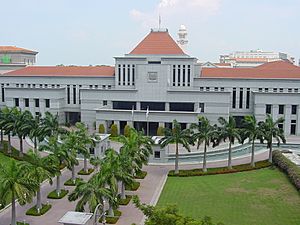Transboundary Haze Pollution Act 2014 facts for kids
The Transboundary Haze Pollution Act 2014 (THPA) is a special law from the Parliament of Singapore. This law makes it illegal for actions that cause or add to haze pollution in Singapore. It also includes rules to stop such pollution from happening. This law was created to allow legal action against companies that pollute the environment.
Contents
What is the Haze Pollution Act?
The Transboundary Haze Pollution Act (THPA) is a law passed in Singapore in 2014. It aims to stop companies from causing haze that affects Singapore. The law focuses on companies, not entire countries. It targets those who pollute and those who allow pollution by other companies or people they control. If a company does not stop burning that causes haze, it can be found guilty under this law.
Why was this law created?
Since 1972, countries like Malaysia and Singapore have often had bad air pollution. This haze came from farmers burning land in Sumatra and Kalimantan, which are parts of Indonesia. Countries in Southeast Asia tried to prevent this with the ASEAN Agreement on Transboundary Haze Pollution. However, by 2006, Indonesia and the Philippines had not officially agreed to this plan. After a very bad haze event in 2006, a professor named Ivan Png suggested that environmental laws should cover pollution that crosses borders.
How the Act Works
In August 2014, Singapore's Parliament passed the Transboundary Haze Pollution Act. This law tries to stop companies, whether they are in Singapore or outside, from doing things that cause haze in Singapore.
Who does the law target?
The law targets companies that cause pollution. It also targets companies that allow pollution by their smaller companies or suppliers. If a company fails to stop or prevent burning, it could be breaking this law. This is unless they take strong steps to stop the burning.
Powers of the National Environment Agency
The National Environment Agency (NEA) and the courts have special powers. They can ask for information about land that companies use, even without help from Indonesian authorities. They can also fine or even imprison companies or people who pollute. This includes pollution caused by their smaller companies or suppliers.
Impact of the Act
The Transboundary Haze Pollution Act has been used to help deal with forest fires. For example, during the El Niño weather event in 2015, the Act helped Singapore respond to fires in Indonesian areas like Jambi and Riau.
Challenges and successes
How well this new law works depends on a few things. It needs to be able to correctly find the companies that are causing the problem. It also needs strong law enforcement. Cooperation from Indonesian officials is also very important. In 2015, the haze caused an estimated S$700 million in losses, according to Minister Masagos Zulkifli.
In 2015, the National Environment Agency sent legal notices to six Indonesian businesses. These notices were about fires on their lands. By March 2017, the NEA had finished investigations into two companies: PT Bumi Sriwijaya Sentosa and PT Wachyuni Mandira. As of September 2021, cases for four other companies were still open. These companies are PT Bumi Andalas Permai, PT Bumi Mekar Hijau, PT Sebangun Bumi Andalas Woods Industries, and PT Rimba Hutani Mas. These four companies supply to Asia Pulp and Paper.
 | John T. Biggers |
 | Thomas Blackshear |
 | Mark Bradford |
 | Beverly Buchanan |


